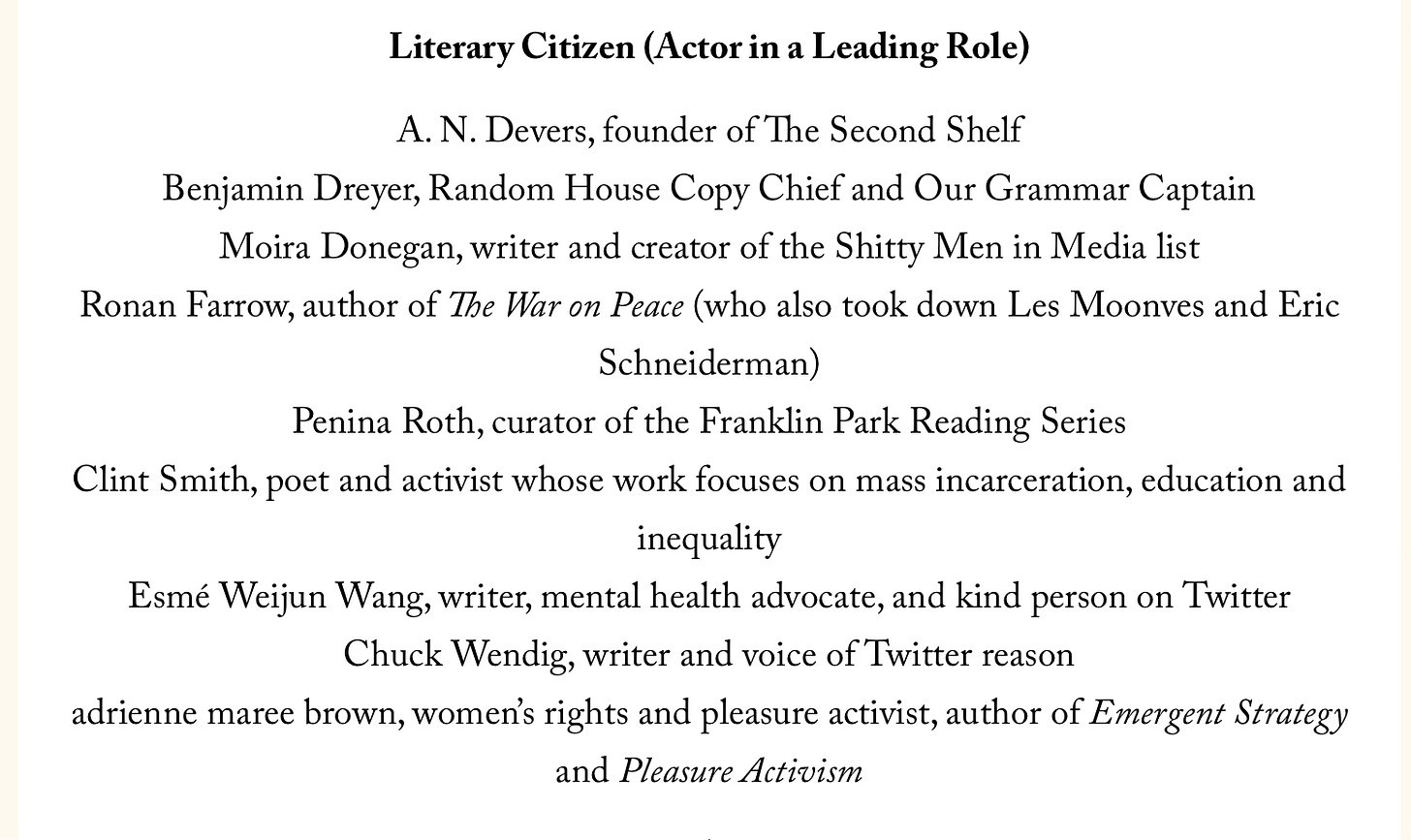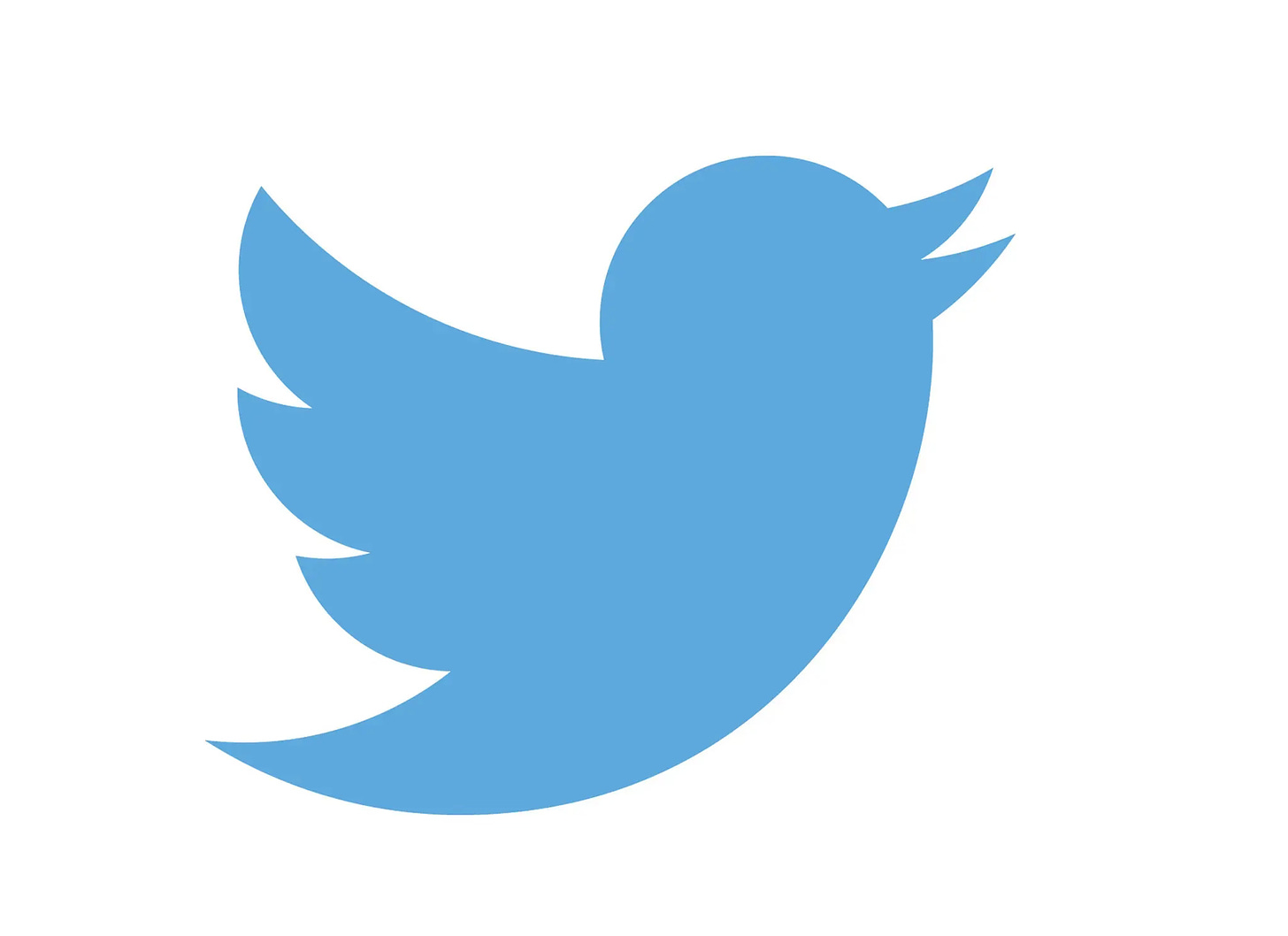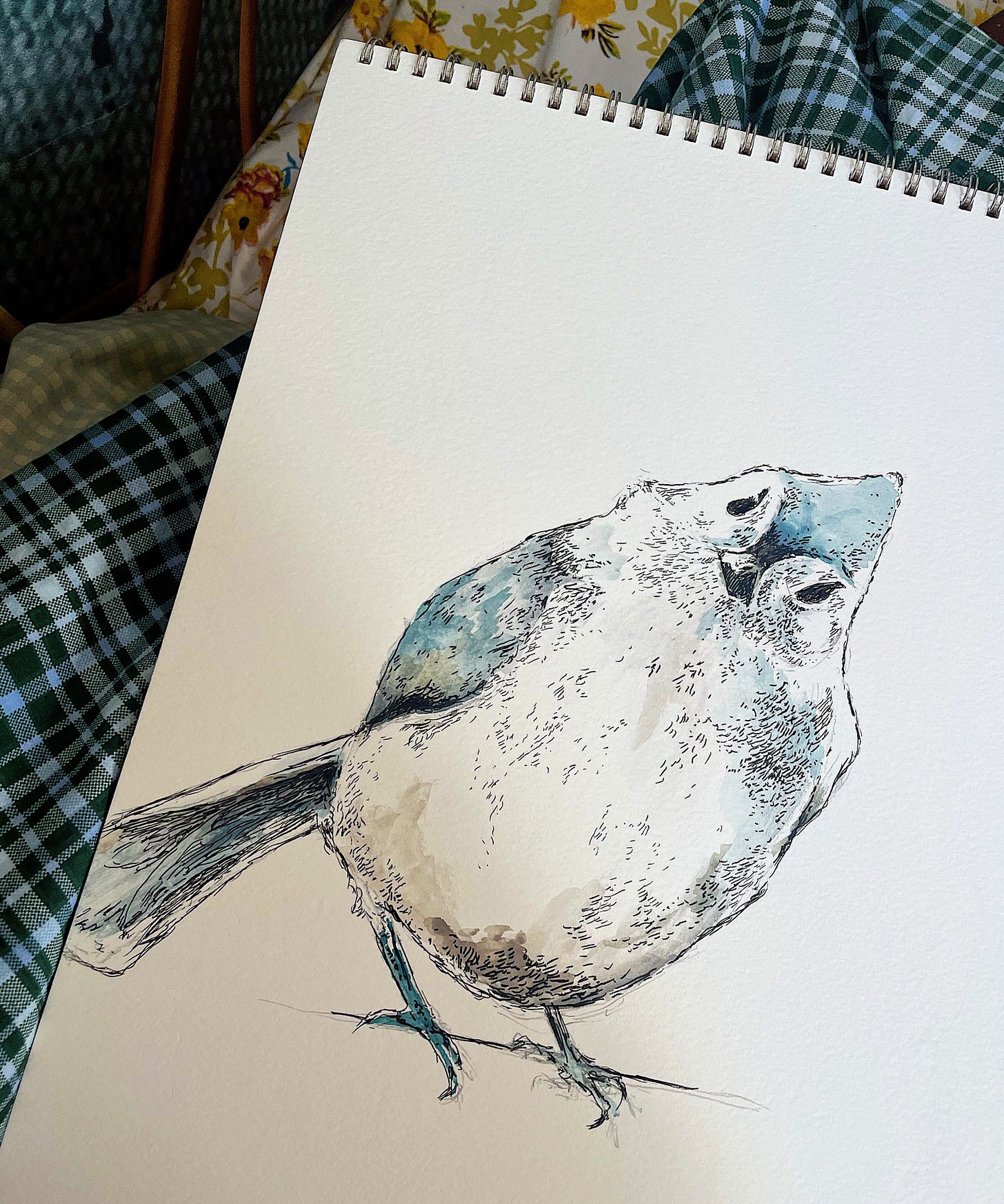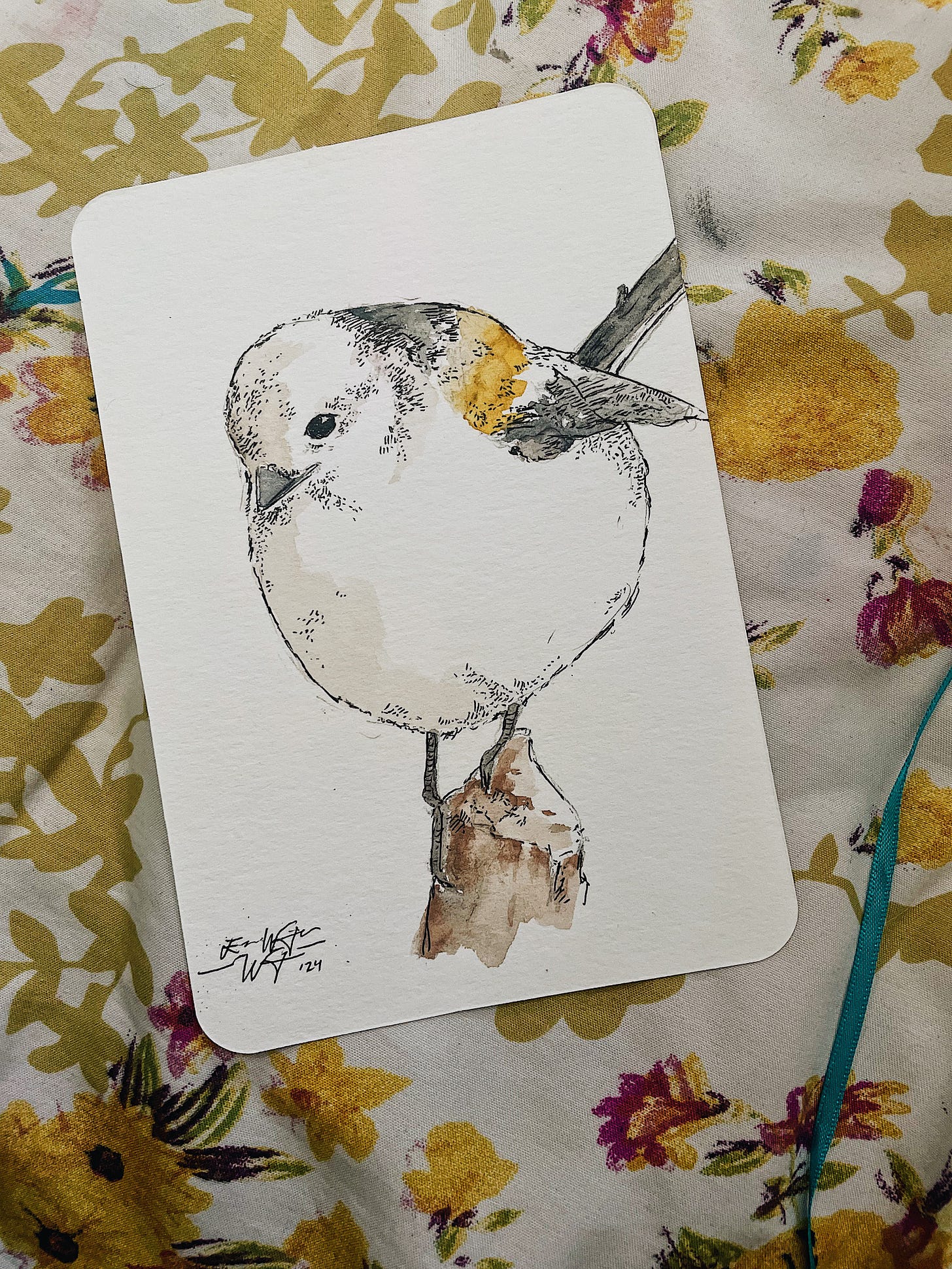For a few years, the popular literary news-and-culture website Lit Hub published a regular post around awards season called, “If They Gave Oscars to Books.” Though intentionally silly and meant to be nothing more than a bit of fun, I was awarded Literary Citizen (Actor in a Leading Role) in early 2019, for 2018, alongside the following luminaries: A. N. Devers, Benjamin Dreyer, Moira Donegan, Ronan Farrow, Penina Roth, Clint Smith, Chuck Wendig, and adrienne maree brown.
I was surprised by this, but proud. I was thrilled to be considered a good literary citizen because while my books have a life of their own, I can exert more control over my behavior in the literary community.
And yet much of my reputation as a “notable literary citizen” had to do with the seemingly necessary evil of that time. Yes, let’s all say it together.
But retweeting other people’s promotional stuff and tweeting about your new favorite book isn’t the only thing that makes for a good literary citizen. In fact, I quit Twitter over a year ago because it was time: just reading my feed would (literally) create a panic attack. So what can we do to be good literary citizens? What can we do to create a supportive and thriving environment for writers and readers alike?
I created a Chat in my Substack to ask this very question: What makes up a good literary citizen? All the responses helped build a complex and vibrant portrait: generous, supportive, inclusive. Here are some main ideas that came out when I went through the discussion, including many of my own. You may not agree with all of them, but hopefully, you’ll gather some tasty crumbs to help guide how you move around as a reader and/or writer in the world.
Emphasize positive reviews.
This is a controversial one, but did come up several times—unless you’re a reviewer for a publication who is required to have strong opinions of all kinds, it might not make sense to talk shit on Instagram about that new book that you just DNF’d (did not finish). People have different tastes; what one person loves, another might not enjoy. Focus on boosting positive reviews of things that you genuinely enjoy, so that you can uplift authors and get their work noticed. Positive reviews not only help an author’s visibility, but also give them a morale boost.
Give strategic support to writers.
We all have limitations, whether that be time, energy, money, or something else entirely—so it’s important to focus our support on the writers and organizations that we truly want to help, especially for authors who are just starting out or are emerging. Buy their books. Promote their work. Attend their events, and, as indie booksellers are always exhorting, buy books at the events.
If you’re a more known writer, make sure to boost lesser-known writers.
Hey! If you’re further along in your career than most others, you have the unique position of being able to spotlight lesser-known writers who might not have gained significant recognition yet. Ways to do so include social media shoutouts, mentioning them in interviews, or mentorship. By sharing your own audience and knowledge, you can help create opportunities for new literary talent (and it feels good, too).
Make sure to focus on inclusivity.
says, “The word ‘citizen’… becomes charged when I think about its historic exclusion of access, so I do wonder at and lean into other notions and words of connection. I seek out literary ‘kin,’ which to me, more than the guardrails of any society, asks for communion more than compliance.”I love this idea—the idea of literary kin—and Michael’s words also speak to something that we focus on in Tbe Unexpected Shape Writing Academy, which is giving voice to the historically unheard. Inclusivity means welcoming writers from diverse backgrounds of all kinds, which then leads to a more diverse canon of literature. Win-win-win.
Try to be kind when approaching other people’s work.
Unless you’re dealing with hateful or discriminatory material, approaching work with kindness and empathy is a sound pillar. Writing is tough, and it’s personal, too. Even if you absolutely can’t stand something you’ve just read, unsubscribing is probably a better way to go than ranting in the comments. (Again, this assumes you’re not dealing with hateful material. Under such conditions, I’ll let you make that call.)
Be generous without expectation.
Are you shouting out someone else’s work? That’s amazing! Just ensure you’re not falling prey to one major pitfall: doing so while expecting the person to do something for you in return. Generosity without expectation not only helps build a strong, connected community but also saves your own sanity in the meantime. Having said that: if you’re the recipient of the shoutout or other generous aid, it is best practice to reciprocate in some way. If someone has written you a blurb for your forthcoming book, for example, sending them a small gift or card doesn’t hurt, and helps build further goodwill.
Good literary citizenship is built on the foundations of generosity, support, inclusivity, and kindness. The notion of literary citizenship (or kinship!) encourages us to think of ourselves as part of a larger family, where everyone plays a role in nurturing and promoting literature. Go forth, and do what you can to contribute to a vibrant and flourishing literary community.
Thank you to: , , , , , , , , , , ,
, and for participating in our conversation.Last-chance sale on Academy 101 classes
Today is the last day our Academy 101 classes will be half off—tomorrow, they go back up to $97. These are what we consider the foundational classes from The Unexpected Shape Writing Academy, though they can be taken without ever joining the Academy. The classes are: Building a Writing Habit While Living with Limitations, Your Best Nonfiction Topic, and the One Day Writing Kickstart, and if I do say so myself, they’re terrific. Have a look at them before these classes finish their time on sale.
“Esmé is exceedingly knowledgeable and her teaching style is the perfect blend of calmly explaining every step of the writing process so you won’t be left confused and answering additional questions. She also puts much thought into every answer instead of giving a quick reply—I felt seen, taken care of and special, even though it was a group workshop.”
—Navina B.
My bird postcards… flying your way
I’ve been sharing my bird drawings and paintings on Substack Notes, and it seems like people enjoy them—so I thought I’d make them into little gifts for paid subscribers. Beginning May 31, I’ll send a bird postcard to a random paid subscriber every two weeks—so keep an eye out on your inbox in case I select you to receive one of these flighty fellas.
This month’s Fireside Chat, which will be about cultivating creativity while living with limitations, will be held for paid subscribers on May 25, 2024, at 10 AM PT. A recording and live transcription will be provided. (Apologies for not sending a recording of the last Fireside Chat; we ran into technical issues, which are hopefully now rectified.)













Thank you for this list. The question has come up in several workshops about how to build a "writing platform" without feeling like you are just constantly selling yourself. And I am much more interested in building a community and being a contributing part of it.
Your bird postcards are so mesmerizing <3